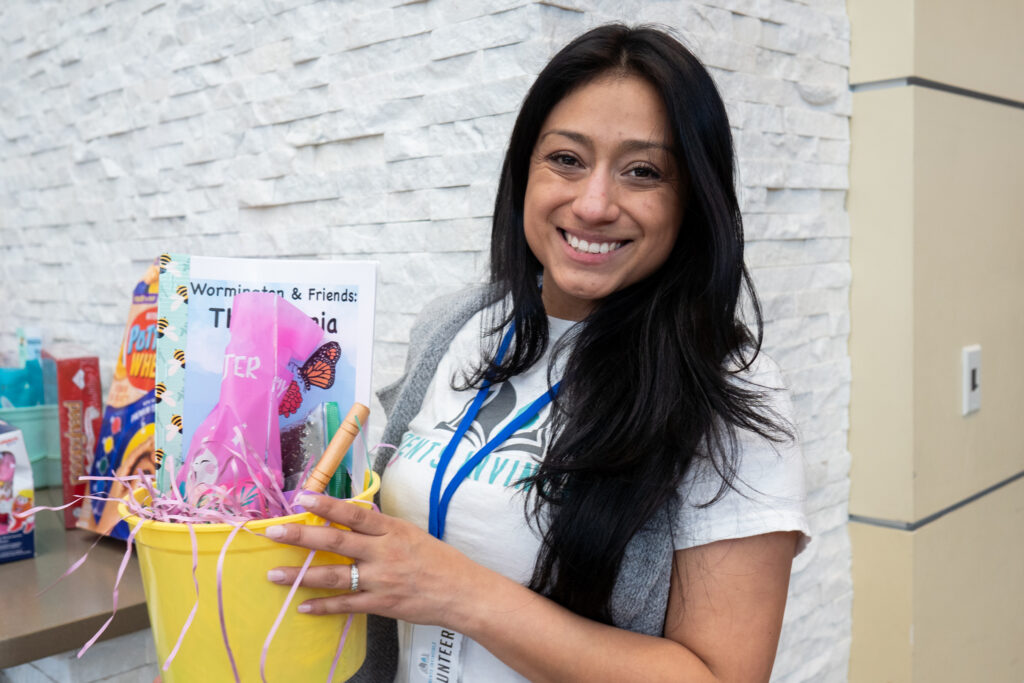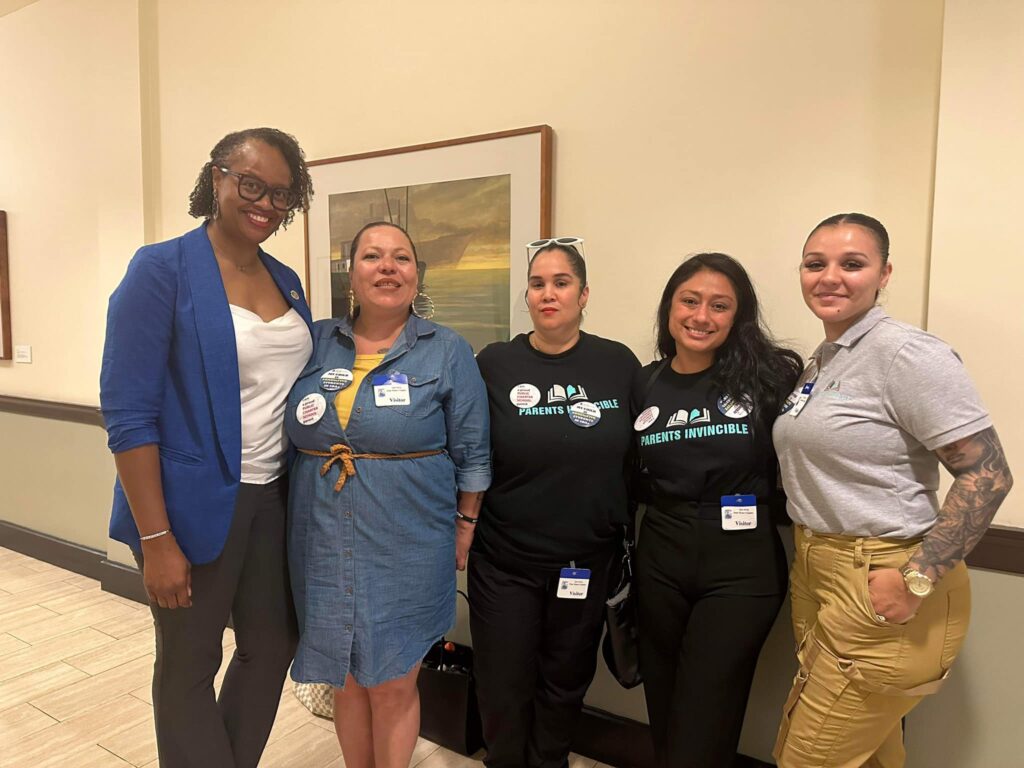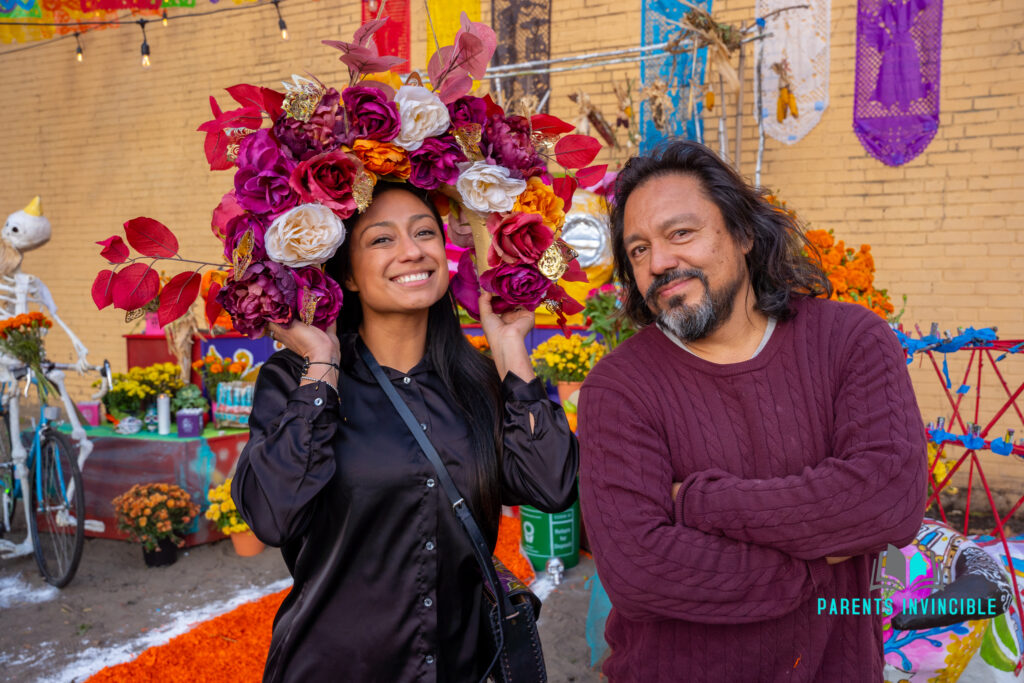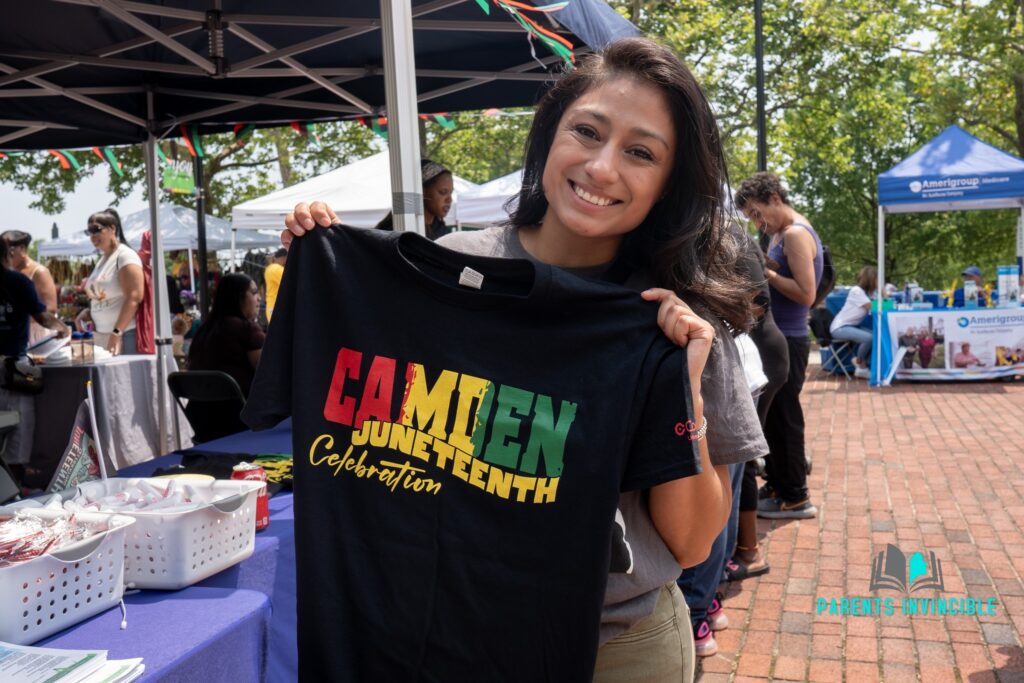
Camden NJ, Gaby Gonzalez’s journey from being an undocumented immigrant to a passionate advocate in New Jersey is a testament to her resilience and dedication. Gaby faced numerous challenges, including cultural shocks, bullying, and food insecurity. Despite these hardships, she persevered, becoming a symbol of hope for many in her community. Today, she works tirelessly to support undocumented families, drawing from her own experiences to empower others and foster a sense of belonging. Her story is one of overcoming adversity and making a lasting impact through compassion and advocacy.
Collins:
Who is Gabily Garcia Gonzalez?
Gonzalez:
Today, I am an undocumented immigrant who is now a resident. I was a military spouse, and I am a mother of two beautiful kids that I adore. I am an advocate here in New Jersey, and I hope to continue advocating for anyone who can relate to me and for people who don’t have a voice. That’s who I am now.
Collins:
Okay, so you said that you were undocumented. What does that mean?
Gonzalez:
An undocumented individual is someone who comes to a different country. It doesn’t have to be the US; we have undocumented individuals throughout the world. It means you were not born in that country. It means you either flew to that country and decided to stay, or you walked or took different transportation to get there. It means you don’t have a Social Security number. When I came, we didn’t have any I-10 or any rights to have driver’s licenses.
Collins:
And you say I-10. What is I-10?
Gonzalez:
It is an identification tax number, which allows individuals, especially here in New Jersey, to get a driver’s license using the I-10 number.
Collins:
Okay. And you came to this country at the age of seven. What was it like living in Guatemala?
Gonzalez:
In Guatemala, many grandmothers and daughters live together. I was raised by my mom and my grandmother. We lived in my grandmother’s house. My mom was the youngest and an only child. My dad worked for Firestone, so I went to private school and lived a normal life. When we came here, I didn’t understand why, but it had always been my dad’s dream to come to the United States. I loved it there. I was surrounded by my grandma; she was like my second mom and raised me. My mom had me when she was 14 years old, so my grandma played a huge part in my life until I was seven.

Gonzalez:
When we first arrived here, we all came together: my mom, my dad, my younger brother, and me. I remember we drove from Guatemala to Mexico City because my dad wanted to ensure it was safe and that he trusted the people bringing us in. One of the hardest things for me was the culture shock. I had never experienced any black individuals, and where my aunt lives in South Central, I went to Martin Luther King Elementary, which was full of black people. That was different, but it allowed me to learn English quickly because I had no choice. My parents separated as soon as we got here, and because my dad was the only one with family members who had some stability, we stayed with him. I remember walking to school by myself with my younger brother, who was three at the time, and taking him to school. I had a teacher, Miss Braddock, who noticed that I was raising my brother.
Collins:
You also faced challenges of being the new kid in a new community in South Central and being bullied. What was that like for you?
Gonzalez:
Oh my God, that was hard. I literally grew up in Crenshaw, and back then, there were a lot of gangs. The area was very segregated. I remember walking over homeless individuals, being scared, and grabbing my brother. I remember running when people tried to jump me. That started when I was in third grade. I learned to find alleys where the homeless people and gang members weren’t. Sometimes I would wait after school until things calmed down and then walk with my brother. It was so hard. Miss Braddock would watch over me, she couldn’t take me home, but she would tell me when it was safe to leave. Sometimes I stayed after school because they had food. I would stay and play dodgeball or double dutch. I even did volunteer work because you were only allowed to stay after school if you participated. It was hard going from seeing my mom a lot to not seeing her at all and being raised by no one, really. Even though we lived with my aunt, we lived in the back, and they made the garage into a room for us.
Gonzalez:
That was hard because I had to learn how to pour cereal for myself and my brother or heat up popcorn and eggs. My aunt made a makeshift kitchen with a stovetop, and I managed that. I remember it being hard. After elementary school, I excelled and got accepted to a magnet school outside the city, in the valley, similar to the suburbs here. I had to be at the bus stop by 5:45 every morning for a ride that took about an hour and 15 minutes to get to school by 7:00. My dad had three jobs at the time—valet, car wash, and valet at night. Because of that, I often missed the school bus. My dad didn’t have a car, and taking public transportation would take three to four hours. So, my dad decided to take me out of the magnet school. I ended up attending all six LAUSD middle schools. LAUSD stands for Los Angeles Unified School District. I moved schools because girls would either try to initiate me into a gang or test me since I was the new, small girl.
At 13, there was a program in LA where a van picked you up after school to sell newspaper subscriptions door-to-door. For every subscription sold, you earned $10. I remember asking my dad for a pair of Jordans, but he couldn’t afford them. All he could get me were the Asian sandals with the mesh. He told me he could only provide rent and food, and if I wanted anything for myself, I had to earn it. I made about $100 a day selling subscriptions. Eventually, I told my dad he didn’t have to work two or three jobs anymore. He was surprised, but I showed him the money I brought home, and I would buy my own things while still going to school during the day.

Collins:
So when you look at young kids today who are being bullied, what comes to mind? What words of encouragement could you give to a young person going through those challenges?
Gonzalez:
Oh my God, there’s always a light at the end of the tunnel. Did I enjoy it at the time? No, no one does. But it built me. I believe God put me through everything so I can genuinely understand and be compassionate when people come to me with their problems. If you haven’t gone through something, you can’t fully understand it. You go through hard times, and one day you look back and realize why. Bullying today is different. Back then, you’d get jumped, or they’d steal your books or backpack, which happened to me often. Now, there’s a lot of online bullying. I hope that by sharing my story, we can use our platforms to voice that bullying is not okay and make a difference.
A lot of people go through certain things, and we don’t know why they’re acting a certain way. So, just being compassionate and really asking yourself, why is this person acting like this towards me? What’s missing in their life? Do they need more love? Do they need more attention? And really, not making it about yourself, but asking how you can help them.
Collins:
So today you are an advocate. You’re a parent advocate, and you’re very successful in education, working with schools. What motivates you to serve as an advocate?
Gonzalez:
My own story. Believe it or not, I never really had the time to sit down and reflect until probably last summer when I realized everything I had gone through and identified my “Why.” It motivates me because I don’t want to be the only Hispanic undocumented girl able to achieve what I’ve achieved despite the struggles. It motivates me because when I found Camden, I saw a lot of kids like me and my little brothers. Now we have more resources, and it’s not as taboo to be undocumented or an immigrant, or to have undocumented parents or be a mixed-status family. That motivates me. We were just talking about the cover kids, which wasn’t available when I first came. Seeing progress firsthand motivates me daily. The kids, my children, my students, my parents, and my leadership all motivate me. Honestly, seeing where everything is going motivates me daily. If you’re not motivated, you need to find your “Why.”
Collins:
As you said, you are an undocumented immigrant who chose to get involved in schools, education, and community outreach. You are very progressive in what you do. What words of advice would you give to other undocumented immigrants about coming into a new community or environment?
Gonzalez:
Find meaning every single day. Wake up and fall in love with life. Learning doesn’t have to come from a book or a phone. Just ask yourself every day, what did I do today? What did I learn?

Collins:
What are the challenges of being an undocumented immigrant?
Gonzalez:
For example, one of the challenges I faced growing up was realizing that, even though I was smart, I had fallen behind in school. I was adopted at 15 by my best friend’s parents, and I had used the excuse that I wouldn’t be able to get a job after high school to justify not trying harder. Now, there are many ways to progress and go to college, and I see that my students face similar challenges. However, it’s not taboo anymore to seek help, and there are people who will assist. Another challenge is that many newcomers don’t speak Spanish but speak a dialect, so we need to find ways to communicate with them or find translators. Food insecurity is also a significant challenge. We need to reevaluate ways to help people ask for help without feeling ashamed. Asking for help is not a sign of weakness; it’s necessary. I’m happy that many of my past challenges are no longer as difficult today.
Collins:
Not only you, but you also keep your children engaged. Why is it so important to have your children engaged in community activities?
Gonzalez:
Because we’re a military family, we got stationed here in 2011. My kids were born here, and they are growing up differently than I did. However, I will never forget where I came from, which is why this community is so important to me. Even though we don’t have family here, I want the community in Camden to be our family. I never want my children to feel above or below anyone. I want them to understand that we are all one, and I want them to have compassion and understanding. It’s important to talk about culture and ancestors. For me, it’s been an amazing journey working with parents and students from the same country as me and learning from other ethnicities. I think diversity is beautiful; we learn from one another and realize we have similar values. I want my children to talk about where they come from and give back. That’s a big value in my house.
Collins:
And your children are very often seen in Camden, volunteering at community events.
Gonzalez:
They love coming here. They love playing basketball here. They have friends here even though we don’t live here. They have wonderful friendships, they go to the gym, play with them, and know them. That, to me, is important because they feel like they belong. It fills my heart because I know I’m no longer walking this path alone; I have two little ones who understand my “Why.” Showing them what I do and why I do it is really important to me.
Collins:
The Anointed News Journal is excited to share your story and even more excited to have you come on board as a team member, as a writer, to share some of your experiences in another language for our readers who read in different languages. With that said, what’s next for Gaby?
Gonzalez:
Oh my God. I think I would love to bring up any topics that the community is interested in. I don’t want to do this alone. I want this to be a community project that I cherish. I never saw myself as a writer. Believe it or not, I didn’t pick up a book until I attended Rutgers-Camden, and the writing part was so hard for me because I never really had support. I want this to be a community-friendly space where people can bring up issues or ask questions, and we can tackle them together as a community. How can we come together? I look forward to talking about all the great things because it’s important to give praise to those who have done the work.

Collins:
And just so that the readers know, you can write to Gaby by way of the Anointed News Journal at the email address [email protected] and ask Gaby any questions on any topic, and we will address those in Spanish.
Gonzalez:
I want my Hispanic community and anyone in our community to know there’s no wrong question. You might have a question that many others also have, so it’s important to be open about it.
Collins:
Gaby, we acknowledge you and your work. We know you are also part of a dynamic team of professionals with Parents Invincible. We certainly want to shout out Parents Invincible under the leadership of Alesha Falcon-Jones.
Gonzalez:
No, I wouldn’t be where I am today without my team. I am who I am today because of my village. It has taken many people to build me, and my team has been nothing but supportive. They know my love for the community.
They love me so much that they sometimes have to stop me. Work has been a second home for me. My team has uplifted me and been there for me through many transitions in my career, personal life, and motherhood. I wouldn’t be anywhere without them. Alesha played a huge role, and I’m so grateful for her. Josie is like my big sister. I remember the first day I came in, she pushed me, and so did Carla. Everyone on the team has pushed me. You have pushed me. I’m not just Gaby; it’s not just me. It’s my village. I’m a representation of every single one of you who has helped and pushed me and continues to do so.
Collins:
So Gaby, the Anointed News Journal has over 180,000 readers weekly. In conclusion, what do you want to say to the readers of The Anointed News Journal?
Gonzalez:
Well, I thank the Anointed News Journal. I wouldn’t even be sitting here without you. It’s been a pleasure to be a part of your community and your village. I’m honored to have such amazing people always believing in me. I don’t want to be the only one. I want to continue to build leaders. One day, I will leave, and I want to leave knowing I’ve built a lot of leaders in this community and left it better than I found it. I can’t do this alone.
Collins:
Now, do you want to give an email or anything so people can reach out to you?

Gonzalez:
Yes, it’s going to be [email protected]. So ask away in Spanish, English, even in Haitian. We’ll figure it out together. We will figure out how to communicate.
In conclusion, Gaby Gonzalez’s story exemplifies the power of resilience and community support. From her upbringing in Guatemala to facing challenges as an undocumented immigrant in South Central Los Angeles, Gaby’s journey has been marked by determination and compassion. As she continues to advocate for immigrant rights and empower her community, Gaby’s impact serves as an inspiration for others to overcome obstacles and strive for positive change.
By Chris Collins

Recent Comments